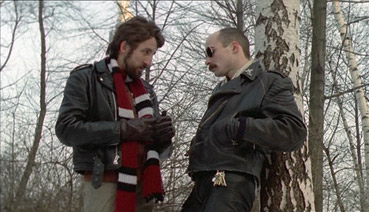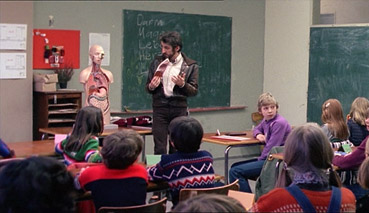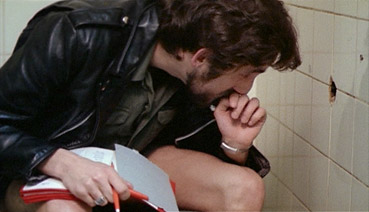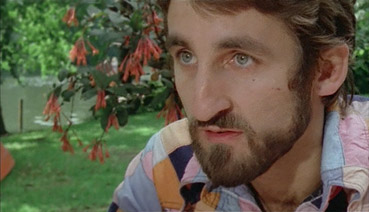| |
"The moment you make yourself public through a film or whatever, it's communicative. Then with that comes the demands from other people to discuss it and grapple with it. I've learned so much from it." |
| |
Writer-director-actor Frank Ripploh reveals one of the
positive aspect of autobiographical cinematic success. |
Taxi zum Klo is one of those rare titles that I was immediately drawn to without understanding what it actually meant. I just liked the sound of the words – they had an almost musical quality, a single recognisable English word followed by reed and glockenspiel. You may well have to be of a certain age, or at least be aware of social history, to get the intended inference of the translation, Taxi to the Toilet. It certainly won't make much sense otherwise, unless you live in a house without basic facilities and have to call a cab every time you need to take a crap.
In our more enlightened times, when openly gay characters can kiss on prime time soaps without the Daily Mail frothing at the mouth for a ban, it's difficult to imagine a period in modern history when schoolboys like myself had no concept of what word like homosexual actually meant. We traded insults like 'poof' and 'bender' without having a clue what we were actually implying or how hurtful they could be if insensitively targeted. Back then, homosexuality simply wasn't discussed, in the home, on TV, or even in the sex education classes that the privileged few managed to wheedle their way into. Hell, most of us had yet to comprehend our emerging feelings for the opposite sex – which evolved as a tortuous combination of intrigue and dislike – to even give a thought to alternative desires.

Looking back from a position of knowledge and experience, the fact that homosexuality was actually illegal seems utterly preposterous, and the very idea that you could legislate someone into a more conformist sexuality is blatantly absurd. But such was the country (and indeed world) in which we once lived, one whose prejudicial remnants even today see gay men and women persecuted for having desires that are different to socially prescribed norm. There's an irony here, of course, one memorably expressed by Stephen Fry back in 1990 on the Channel 4 self-interview programme Star Test,* when he noted that the most vocal parliamentary opponents to homosexuality had all gone to public school, and thus had "all had a vacuum cleaner up their bottom at one time or another."
But back in a time when you could be arrested for loving your fellow man, such liaisons had to be conducted under the cover of secrecy, which in urban areas at least gave rise to an activity that became known as 'cottaging', in which public toilets became the meeting place of choice for no-strings-attached sexual encounters. Even after the passing of the 1967 Sexual Offences Act, which legalised private consensual sex between two adult males, cottaging remained both popular and illegal, and despite its quaintly English name was not confined to the UK, as longtime fans of singer George Michael will doubtless recall. Of course, he was not the only famous name to be caught with his pants down – others charged with acts of indecency or importuning in public toilets over the years include actors Sir John Gielgud, Wilfred Brambell, Peter Wyngarde and Leonard Sachs, Five Star's Stedman Pearson, and US senator Larry Craig. Oh, and let's not forget Michael Turnbull, who was arrested for cottaging in a Hull public toilet before going on to become the Bishop of Durham. Nice one, your grace.
Taxi zum Klo wittily links itself to this practice through a title that is later revealed to refer to the occupant of the said vehicle's urgent need to urinate, which results in a sexual encounter by chance rather than design. The man in question is the cheerfully carefree Frank, a primary school teacher who spends his evenings cruising Berlin's gay hotspots for casual sex. One night he hooks up with cinema usher Bernd and invites him to move in, and the two embark on what appears to be a more serious long-term relationship, but Frank is soon back to his old promiscuous ways.

This may not seem much in the way of a plot, but what made Taxi zum Klo such an important and revelatory film back in 1980 had less to do with story than the manner in which it was told. Twelve years before the term New Queer Cinema was first coined, gay characters were still largely consigned to supporting roles in heterosexual dramas, and too often portrayed as either as screaming queens or psychologically unstable misfits. As Berlin Film Festival programmer Wieland Speck says on this very disc, "If there were gay characters in films, they either went crazy or ended up dead." What made Taxi zum Klo feel so revolutionary was that its central character was shown as being essentially no different from his heterosexual counterpart. Frank is not portrayed as a misfit or as a man riddled with angst over his sexual preference, but as an ordinary guy who is good at his job, who enjoys his life, and who is as witty, good natured and intermittently insensitive as the next man. His relationship with Bernd even develops along the lines of a troubled marriage, where after a honeymoon period and talk of settling down, Frank takes on the role of insensitive and unfaithful husband, going out on the pull while Bernd stays home preparing food that his partner fails to appreciate.
That the film has a strongly autobiographical feel is hardly surprising. The lead role is played by director Frank Ripploh (they even share the same name and nickname), the cast is made up of his friends and associates, and almost everything in the film is drawn from his own experience. Shot in semi-documentary style by cinematographer Hans Wittstatt, the film has the intimate feel of a professionally shot video diary, complete with voice-over reflections and a sexual frankness that is still startling today. Indeed, if you're one of those prudes who screws up their face at even the thought of two men kissing then you're probably going to suffer a small meltdown here. Actions depicted include mutual fellatio, anal sex, a rectal exam, belt spanking, and a golden shower into the mouth of a willing partner, every one of them done for real and shown in sometimes explicit detail. But this never comes across as a deliberate shock tactic, more a desire by Ripploh to share with us even the most intimate aspects of his and his character's everyday life.

For all his faults, Frank is a man who lives life to the full, something energetically reflected in the film's sometimes playful approach, announced from the start through a jovial use of bouncy pop tunes and a comical title sequence that sees a naked Frank locked out of his flat after sneakily trying to steal a neighbour's newspaper. By drawing such close parallels with what we tend to perceive as a normal heterosexual lifestyle, Ripploh also challenges the conservative horror at the very idea of a promiscuous homosexual in charge of a class of primary school children by asking, through implication, why on earth not? Frank is clearly a damned fine teacher (Ripploh himself was also once a schoolteacher) who draws a clear line between his private and professional life, fully engaging his class and turning even his morning misfortune into a learning experience for them. And despite his addiction to night-time pleasure, he takes his professional responsibilities seriously, privately tutoring one of the slower students (and in direct contrast to the film Bernd and Frank's transvestite friend Wally are watching in the back room, there is no sexual intent here whatsoever) and taking his marking with him on a cottaging trip, where his work is interrupted by the arrival through a glory hole of, well, I'll leave you to work that one out.
The winning naturalism of the performances, the documentary feel (there's no sign of the current trend for headache-inducing waggle-cam here), the casual explicitness of the sexual content, the exuberant assurance of the filmmaking, and the sadness that tinges its sense of fun, has assured that Taxi zum Klo feels almost as fresh now as it did back in 1980. And while its pre-AIDS promiscuity can't help but feel now like a nostalgic hark back to the halcyon days of sexual adventure, as a love story and a preach-free plea for acceptance and equal standing, it's as relevant and persuasive as it ever was.
Shot on 16mm film in sometimes less than ideal lighting conditions, the film was never destined to have a Hollywood sheen, but the rough-and-ready look, with its pastel coloured palette, slight image softness and sometimes narrow depth of field, adds immeasurably to the film's intimacy and documentary feel. The image has been restored here and has scrubbed up very well, having a sometimes impressive level of picture detail and generally well balanced contrast. No obvious signs of enhancement are visible on the image itself, but there is a sometimes very visible grain that looks more digital than photo-chemical. The framing is approximately 1.74:1 and the picture is anamorphically enhanced.

The Dolby 2.0 mono soundtrack is generally clear and has a narrowness of range consistent with the film's age and budget. There is an almost constant crackle in the background which presumably fought all attempts at restoration (to be honest you'd need to find a pristine original soundtrack to remove this), but is soft enough not to be a distraction, and is not even audible in louder scenes.
Mark Kermode intro for Film4 (4:21)
The image-conscious Mark Kermode introduces the film's first uncut UK TV screening for Film4's 'Extreme Cinema' slot on 17th September 2005. As ever, his delivery makes him sound like he's suppressing some personal pain, but this is still an excellent introduction to the film and its journey through the censorship battle zone.
A Short History of Taxi zum Klo's Release in the UK (29:13)
Former ICA cinema manager Archie Tait, Gay's the Word bookshop proprietor Jim MacSweeney, and Tim Highsted of Channel 4 recall their first viewing of the film and assess its importance and impact. Tait also provides a detailed history of the film's first UK screening, which he was instrumental in organising, and the censorship issues it initially faced. His Edinburgh Film Festival story is particularly enjoyable.
Historical Documentary on Taxi Zum Klo (18:29)
Close friend Eckhard Büttner and filmmakers Ulrike Ottinger and Rosa von Praunheim recall writer-director-actor Frank Ripploh's journey from fun-loving friend to successful filmmaker and his subsequent problems – Büttner believes that he was ruined by sudden success and that his 1986 film Miko – aus der Grosse zu den Sternen was "horrible" and "unbelievably badly made." Berlin Film Festival programmer Wieland Speck contributes a well argued assessment of Taxi zum Klo's importance and qualities.
Interview with Director: Taxi to Cairo (23:01)
Frank Ripploh answers questions from the press following a screening of his less well received follow-up film, Taxi to Cairo, at the Montreal World Film Festival. A valuable archive inclusion, it requires some patience to get to the meat of the piece, with questions asked in French, translated into German by Ripploh's interpreter, replied to in German, translated into English, then back into French by the session's moderator, all in real time. But it proves worth the effort for Ripploh's responses, particularly when he dispenses with his interpreter and replies in English to an English language question, which almost plays as if his passion has temporarily disabled the language barrier.
Taxi zum Klo Trailer (1:24)
A UK/US trailer for the restored uncut version included on this disc.
Little Joe Booklet
A 12 page booklet containing detailed and revealing interview with Frank Ripploh from issue 2 of Little Joe, which describes itself as "a magazine about queers and cinema, mostly."
A film that would probably prompt diehard prudes to faint on the spot, Taxi zum Klo is in many ways the very definition of both extreme and outsider cinema, but is also a touchingly handled love story and a strikingly honest record of the Berlin gay scene of the time. It fully deserves its reputation as a Queer Cinema classic, and is given first class treatment in Peccadillo's Collector's Edition DVD. Highly recommended.
* My very real thanks to Anthony Nield for identifying a programme I was racking my brains to recall.
|